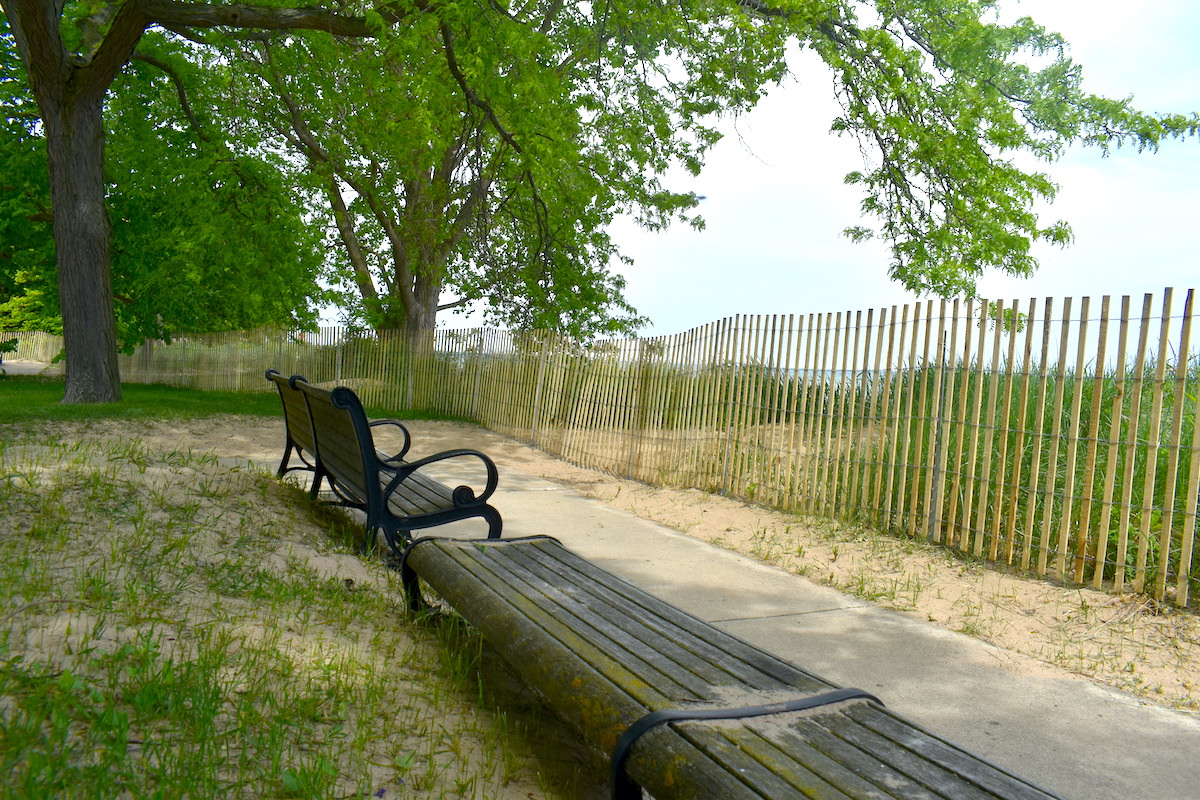
Summer on Wilmette’s Lakefront: Fewer emergency calls, fewer season passes, more single-use passes
Lakefront leader gives annual report to Park Board
The changes at Gillson Park that allowed swimmers into the water at South Beach have helped both beach patrons and the lakefront staff serving them, the district’s lakefront general manager told Wilmette Park District commissioners on Oct. 14 during her annual report.
The policy adjustment, including fencing the beach’s south end during the summer season and requiring users to pay to use the formerly free area, have upset many park users. But the changes cut the kind of tension-filled incidents that staff had to deal with in 2023, Megan White said.
“I know we still have a lot of reflection about South Beach specifically in the coming months. I can say we saw less emergency calls initiated by staff, a lot less confrontation,” she said.
“I felt safer at work this summer when I was down there. I was not surrounded by a group of other adults, screaming at me.”
South Beach’s future is up in the air; before White spoke, Park District Executive Director Steve Wilson said the district will hire the marketing firm Public Communications Inc., generally known as PCI, to gather community opinions about the current beach policy with the help of focus groups and other outreach. That will probably happen in the first half of January, he said.
In addition to PCI’s work, which should conclude with a written report, staff will review public comments and emails about the issue, he said.
“Staff would then come to board meetings and present all the information, all the process, all the reports and ultimately come to a decision on the management of South Beach in 2025,” Wilson said.
In her annual report, largely focused on the summer months because a majority of lakefront activities take place then, White said her staff numbers increased to handle South Beach’s new status to allow swimmers, adding lifeguards to handle four new chairs there. Lower lake levels allowed for swimming at Langdon Beach, with one lifeguard chair on duty there, she said.
Of the 205 seasonal staff hired this summer, including lifeguards and general staff, 138 were returnees who had previously worked for the district, and 140 were Wilmette residents. White said.
By the end of this year’s summer season, which ended in September, the district’s three swimming beaches recorded thousands of visits; however, fewer residents and non-residents bought season passes. In 2023, the district sold 12,054 season passes, a number that dropped to 9,209, the lowest total since 2019.
Season pass revenue dropped from $587,260 in 2023 to $488,105, well below the high point of annual season pass revenue totals of $751,620 in 2021. Such passes were required during the pandemic, White said. As COVID limitations ended, those numbers dropped, she said: “People aren’t coming as regularly, and they aren’t required to have (season passes) to visit.”
Many beachgoers also bought booklets of guest passes, she said. That number jumped steadily, from 700 in 2022, to 3,192 this year.
At the same time, daily passes for Gillson’s main beach — $11 for residents and $17 for non-residents — rose from 25,319 last year to 28,835, she said. Revenue from those passes rose from $379,804 last year to $455,443 this year. The number of South Beach daily passes, which cost $5 for residents and $10 for non-residents, stood at 31,133, with revenue at $270,760. The number of visitors at Langdon were 666 passes (all at $11 and $17) for $9,354.
White’s report also included registration and revenue numbers for the district’s lakefront camps. She acknowledged that the number of registrations for 2024 lakefront aquatics camps dipped this year. She defined registrations in the number of camper weeks, which she said she felt was the best measure of participation. That dropped from 932 in 2022, to 770 last year and 480 this year.
White attributed this to increases in camp prices. Those increases were necessary at least in part because of the increase in sailing school programming, she said. Thus, camp revenue rose from $95,062 in 2023, to $140,030 this year, because of price hikes, even as camper weeks declined.
Park Board member Mike Murdock asked White what staff thinks about the lower registration numbers amid higher prices, saying “The general question I’d ask is, that obviously we like seeing revenues go up. But how does the staff look at the success of this? We didn’t have quite as many participants.
“Is that a good thing because you need fewer staff, so the bottom line is better, or is it a bad thing because there are fewer folks (making use of programs)? How do we look at these numbers from your perspective?”
Staff is aware that some potential lakefront program users find the higher fees prohibitive, White said. She reiterated that the increases were necessary, to cover increased service to program participants, for instance in this summer’s sailing camp; however, she said staff didn’t expect prices to rise any further.
White’s report, which broke camp registrations down by program, also included information on Gillson parking lot use during the summer, and the use of Gillson’s dog beach.
Her full report is part of the Oct. 14 Park Board meeting packet.

Kathy Routliffe
Kathy Routliffe reported in Chicago's near and North Shore suburbs (including Wilmette) for more than 35 years, covering municipal and education beats. Her work, including feature writing, has won local and national awards. She is a native of Nova Scotia, Canada.


